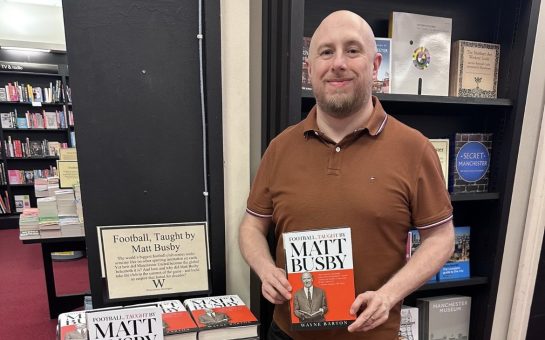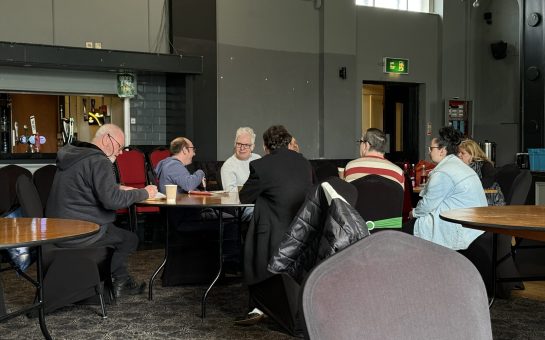With astronomical wages, scandals, strops and bust ups littering the sports pages it is sometimes easy to forget that football, at its heart, is a game that has the incredible power to unite and inspire.
With two of the biggest clubs in the world plying their trade in Manchester the city has become synonymous with football.
However, while the majority of the eyes are firmly fixed on Old Trafford and the Etihad at weekends there is also a much lesser known club that is unlike any other in the city – Manchester Blind FC.
Every Thursday evening the club’s blind and partially sighted players meet for training with a dedicated group of volunteers at Manchester Communication Academy, and MM joined them to find out more.
In blind and visually impaired football specially designed audible footballs are used which rattle due to ball bearings contained inside. Teams are 5-a-side and, as the level of visual impairment can vary among players, blindfolds are worn by everyone except the goalkeeper who is sighted. Behind the goals sighted guides also stand and make noise to help direct players.
Manchester Blind FC currently provides training for two age groups – an adult team for over 16s and a children’s session for those between 5 and 15 years.
Pamela Harper, 28, from Oldham told MM how the club has benefited her two sons, Bradley aged 9 and William aged 7.
“It was hard to find activities that actually focus on the boys, then I heard about this. Bradley is already thinking about the Paralympics and I’ve never seen William run so fast in my life,” she said.
However, for the club to keep going it is vital it receives more funding.
As such, it is currently competing for a Lloyds Bank Community Fund – an initiative which shortlists four good causes in each community and then invites the public to cast votes on how the awards, two of £3000 and two of £300, are allocated.
The club hopes to increase numbers of both players and volunteers so that they can create two children’s groups as well as an adult team ready to compete in the National Blind League.
One member of Manchester Blind FC who has already experienced playing in League games is 28-year-old Danny Clarke from Salford.
“It is just as competitive as mainstream football. There is a lot of contact,” he told MM.
Danny, whose inherited form of Retinal Dystrophy means that he is completely blind, finds that playing football has helped improved his awareness of surroundings.
The club has an obvious social aspect too. Through playing blind football Danny met Middletonian Liam Dempsey, 33, and the two friends have just got back from a holiday in Portugal.
Laughing at their adventures, Liam said: “We’re thinking of going to Magaluf next, or maybe Ayia Napa.”
Liam who also has no vision as a result of the genetic condition Retinitis Pigmentosa, is less competitive than his mate, but loves how social playing can be.
“I do it for a kick about, for fitness and to meet new people in the same predicament.”
This is exactly what the club’s founder Ruth Walmsley intended when she set about creating Manchester Blind FC.
Oldham-based Ruth, 50, has lived in Manchester all her life. She was diagnosed with Retinitis Pigmentosa at the age of 28 and gradually lost her sight by the age of 40.
“Of course it was devastating at first, but I’ve met so many wonderful people who I wouldn’t have if I wasn’t blind,” she said.
The idea behind Manchester Blind FC first came to Ruth in the summer of 2010 during England’s World Cup game against Germany.
While the crushing 4-1 defeat put the English team’s footballing dreams on hold, Ruth began to wonder if there was an equivalent for sightless players.
She discovered that there was not only a Blind World Cup, but that it was being held that year in Hereford, where the English blind team are based.
After going to the opening game with her husband Neil she did further research and found that, while there were blind and visually impaired football leagues, there was no team in Greater Manchester.
Being a county that loves its football, this came as a surprise.
“The expectation was that there were already PAN disability football groups people could use or that players would travel to Merseyside if they were interested in blind football, as they were more experienced, established and had FA funding for the North West,” explained Ruth.
However, she set about changing all that, first by getting in contact with Dave Kelly from disability charity Daisy UK who helped her organise a match played by sighted colleagues wearing blindfolds in order to raise awareness of blind football.
Coaches from Manchester City, Manchester United and the FA as well as an RNIB representative attended the game which was held at United’s former training ground The Cliff. Late Coronation Street actor Bill Tarmey was also there to present a winner’s cup.
By advertising in RNIB’s and Henshaws’ newsletters Ruth found that there was an interest amongst local blind and partially sighted people in playing football. After purchasing some audible footballs which were left over from the World Cup, and arranging weekly sessions at the Cliff while one of their teams were away, Manchester Blind FC was officially formed in June 2011.
It is apparent that a lot of thought has gone into the club’s creation, right down to its logo and team colours.
They chose yellow because it is one of the last colours to go when people lose their sight, and their emblem is the bee, a symbol of Manchester and it’s industrious past being part of the city’s coat of arms.
When the Cliff’s regular team returned the Manchester Bees had to look for a new venue and fortunately the Manchester Communication Academy stepped in offering free use of their Sports Hall.
Along with venue changes and the expensive equipment needed to play, perhaps the biggest hurdle the club has met is finding coaches experienced in blind and visually impaired football.
“Local coaches weren’t coming forward, they didn’t know blind football,” remembers Ruth.
“I was at the end of my tether when Martyn our Head Coach arranged to work with Merseyside FA who had been going a number of years to train and take our players for experience. A couple of Merseyside’s players would join us some weeks, including Roy Turnham, an England Squad player and great role model.”
The club now has two dedicated coaches in Martyn Twist, 32, from Bacup and Dave Wilkins, 31, from Oldham. Both are FA qualified and work for Manchester Blind FC voluntarily on top of other coaching commitments.
“It is extremely rewarding, and it is so important that the club exists,” said Martyn.
Dave agrees and emphasizes the importance of keeping the club going for future generations. “Just one kid coming through will be a success,” he added.
As part of its drive to increase numbers and raise awareness of blind and visually impaired football, the club has been giving presentations at local school assemblies.
It is all about ensuring that the profile of disabled sport, at its peak last year with the London Paralympic Games, does not now wane in the public’s consciousness.
“The public were definitely on board in 2012 – capturing the attention of today’s youngsters is the way to sustain the Paralympic legacy,” said Ruth.
Indeed, Ruth was herself involved in capturing this attention, being one of the Paralympic torch bearers who helped carry the flame from Stoke Mandeville to the Opening Ceremony.
She was nominated by a colleague for her fund raising and volunteer work for a number of different charities prior to setting up Manchester Blind FC, and bore the flame along Cross Street in London.
“I have come across many disabled people and their supporters with a passion to take part in sport and keep the legacy alive,” she said.
“My recent experience in schools and other organisations is that there is an interest there, it’s simply that presentations such as the ones we have started, need to continue across all sport.”
To get involved with the club either as a player or a volunteer, contact them via their website http://manchesterblindfc.co.uk/
You can also vote for Manchester Blind FC in the Lloyds Bank Community Fund by texting LDJA to 61119, online at www.lloydsbank.com/communityfund or in person at Oldham and Royton Lloyds Bank branches. Voting closes on Friday November 1.
For more on this story and many others, follow Mancunian Matters on Twitter and Facebook.



